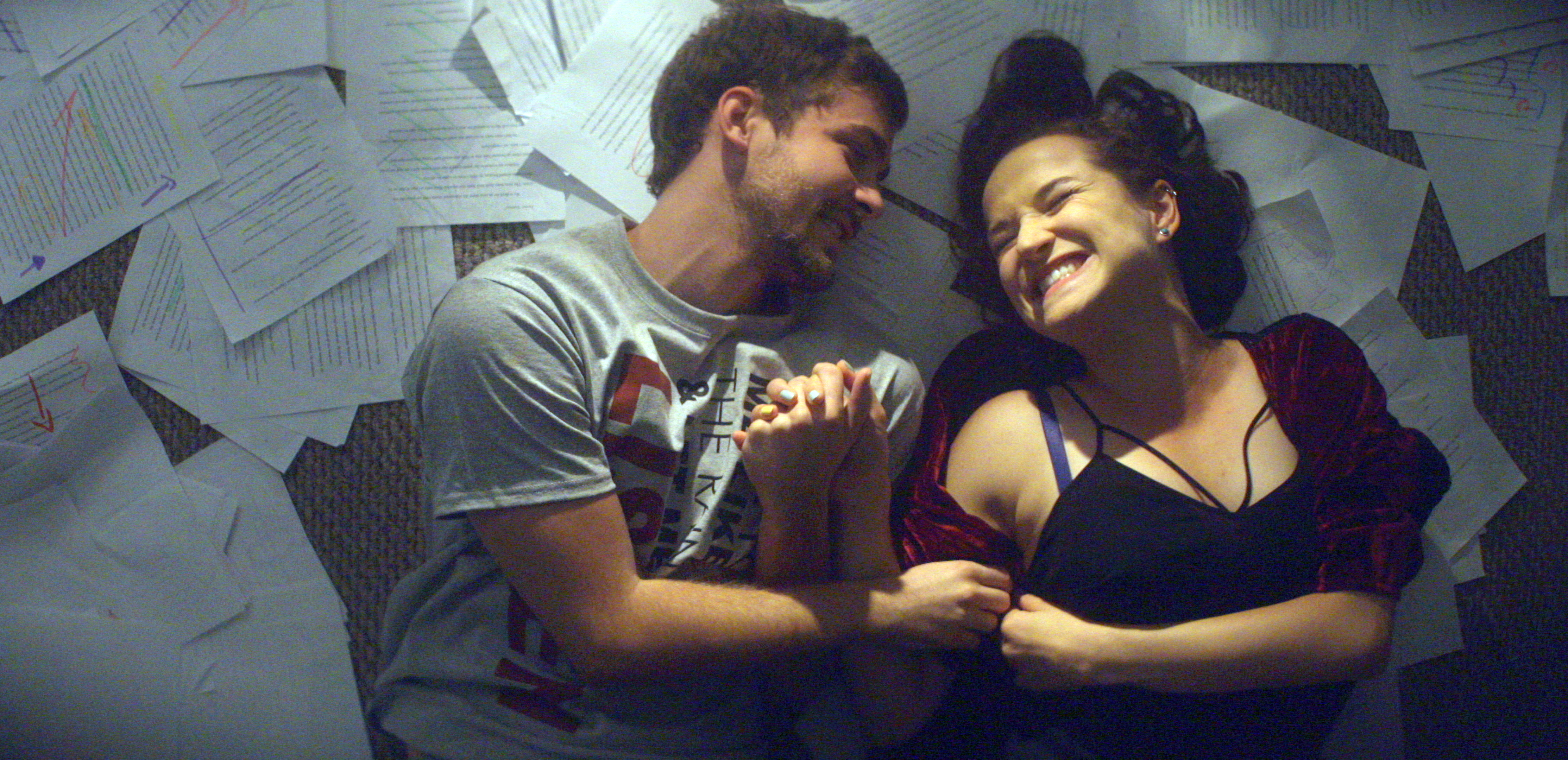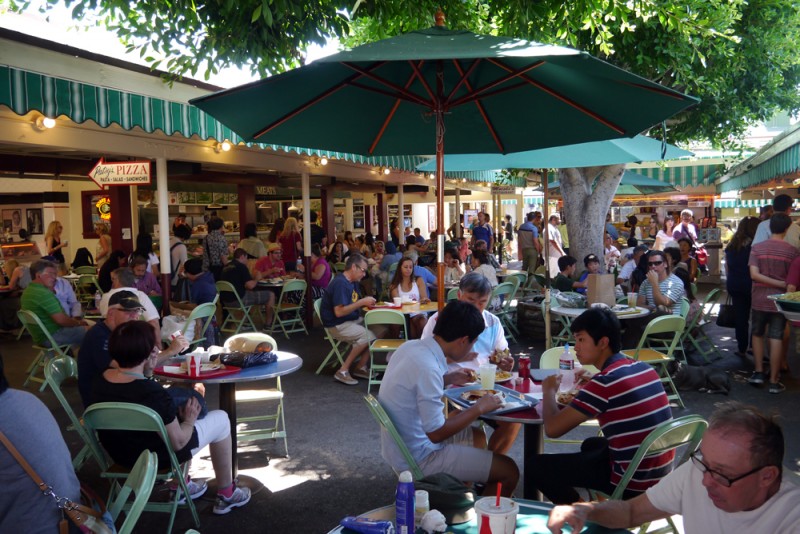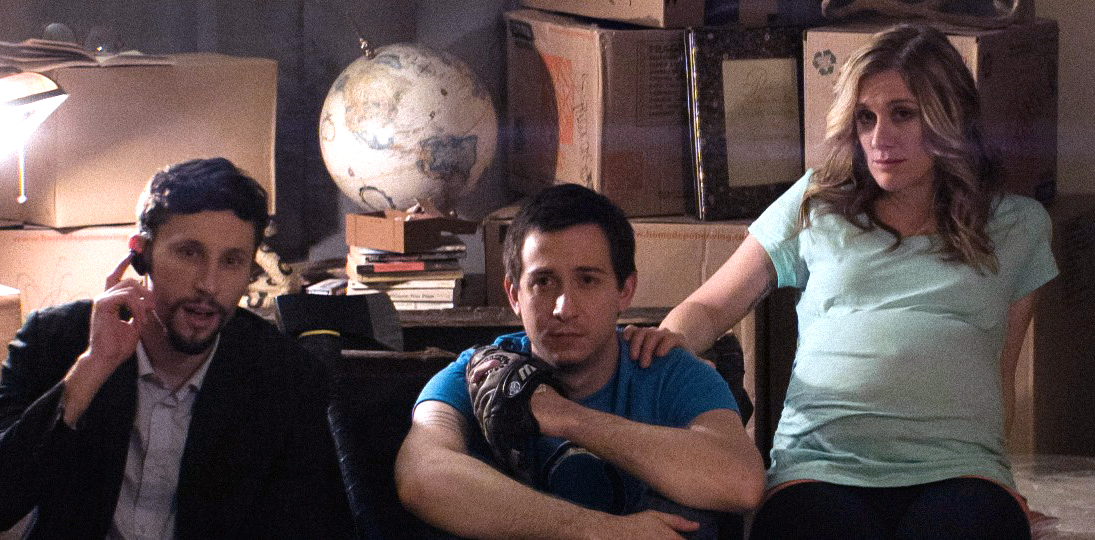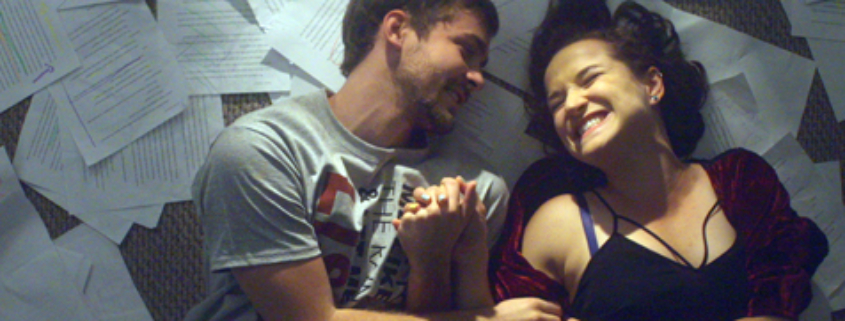Becoming Characters

Still image from I Will Go With You. Photo Credit: Kenneth Bauer.
I’m staring at the footage from a short film I shot two years ago. I put so much time and energy into the production—writing the screenplay, casting actors, rehearsing, raising money, planning the artistic design, figuring out technical aspects of the cinematography—only to see it shelved after production wrapped. Making films requires a lot of effort, one could argue that independent productions require more effort due to budgetary and personnel constraints. The projects are fueled by passion; they’re huge risks to begin with. In the case of my currently unfinished film, a romantic comedy called I Will Go With You, things came to a halt in post-production. After months of work, my editor’s progress was destroyed by a defunct hard drive and I couldn’t pay a new editor. Life got in the way and the project fell through the cracks. It wasn’t until recently that I found time to pull out the backup hard drive where the precious footage is saved, load it up into the editing software, and see if I could salvage the project.
Scrubbing through the footage, watching the actors perform my writing under my direction—the heavy feeling of potential failure sets in my stomach. I wanted to create characters, and now their fragments surround me. Part of me wants to scrap everything, forget the film and just focus on my prose, but I know that I should finish what I started and see these characters through.
* * *
I always wanted to be someone else. Getting to leave your world and troubles behind, if only temporarily, is part of the joy of reading literature and watching movies. For a little while you can intimately focus on someone else’s life without the burden of ever having to actually interact with them or their problems. Eventually, this form of escapism wasn’t enough for me; I wanted to take the escape a step further and create new people, worlds, and stories. Now I write fiction and make films.
The difference between reader and writer is that the writer is in the business of creating characters (or recreating them, if it is creative nonfiction). Studying and developing characters was not as important to me in my early writing, but my storytelling improved once I realized that characters drive stories. A writer creates a fictitious person using language and ideas with the intention that the characters will be so believable that a reader will carry them not just for the span of the book, but in memory for all time. My prose and screenplays became less rigid and more fluid when I invested time and energy into my characters. I wrote to let the characters come alive, but I still felt as if I was missing something. I needed to learn what it meant to become a character so that I could fully develop my own.
This epiphany started me on the path of acting, a very different craft from writing but still based in storytelling. As much as they can, actors accept the writer’s gift of character and channel that into their own flesh and bones. It is not the actor’s job to redesign the character, but to interpret it. Sometimes in the process of interpreting, an actor might make discoveries about the character that can bring an altogether new light to the story. This type of inside-out thinking on an actor’s behalf can help a writer actualize under-developed parts the story.
It might seem like a stretch for prose writers to conceptualize their characters as entities performing before them in real time; although prose writers animate their characters in the mind, they are most concerned with constructing characters with words on a page. A great practice for writers is to read their work aloud, but when I took this idea further I never looked at creating characters the same way again.
* * *
When I moved to Los Angeles I was desperate to find an agent who could get me auditions for legitimate gigs. Acting, like any craft, should be about the craft itself, not what follows. At first I erred on setting my sights toward some type of fame or fortune. I had it all wrong. It seems to me that since I’ve understood this, if I’m being true to the art at hand, personal success tends to follow naturally.
I learned that acting is not just a matter of memorizing lines and blocking; a person brings their entire mind and body to their character. In order to do this, the actor must have an understanding of why their character would say what they’re saying, why they are saying it that way, why they move in certain ways, in order to recreate the emotions of their character in real time. When an actor uses the power of empathy they embark authentically on the character’s journey and make the story real for an audience.
When the character starts to crystalize you get the itch to develop new mannerisms and patterns of speech specific to that character. Sometimes it is so difficult to escape your own subconscious habits that it feels impossible to deliver an original performance.

Original Farmers Market, Los Angeles
To study human mannerisms, I went to the Farmer’s Market at The Grove, a condensed fusion of people from all over the world converging in one place for lunch. Sitting with a notebook, from behind my sunglasses I watched and notated the various habits of people—how they talked, how and what they ate, how they moved, how they interacted with lovers or friends. Observing people led me to ask questions about different characters’ psyches: why would a person laugh like that? Why would a person wear such a scowl on a beautiful morning? What is their story?
When I performed in my first independent feature film, I spent so much time committing to my character that when I showed up to set I felt like an entirely different human. I played a villain who manipulates people into doing terrible things—to empathize with this person was extremely challenging, to say the least. I memorized the lines. I rehearsed with different objectives and motivation behind each delivery. I embodied new mannerisms, and learned enough about this person that I could connect with even the worst parts of him. The moment I became someone else in character I found the same sense of escape that came from creating characters and reading great literature.
After acting became part of my normal routine, it wasn’t long until I missed the feeling of writing and creating my own characters again. Countless auditions, plus long hours of waiting on set to deliver lines gave me plenty of time to think about my writing.
In the down time I tried to collaborate with people I met on gigs, both cast and crew. I started to carry a notebook and write as much as I could when I wasn’t needed on set. Within a few months I had a screenplay co-written with a friend, and a few months after that we were set for production. However, this time around I didn’t want to merely create the characters: I wanted to become them and direct them too. Such creative control is a lot like constructing an entire book; the creator has nearly complete authority over every aspect of the final product. Filmmaking presented the opportunity to create a different type of storytelling illusion, one with moving images, which is something that prose cannot do with paper and ink alone.

Still image from The Chest. Photo Credit: Kenneth Bauer.
Here was the new challenge: write a script that could be shot with a low budget, procure the production equipment, find a skilled crew willing to work for passion and experience, rehearse the script to flesh out characters, and finally get it all on camera. The result was a completed short film called The Chest, about three estranged siblings who reunite to discuss their dead father’s will. My co-writer and I each played a sibling, and I directed the film. Up to this point I had directed, I had acted, and I had written, but I had never performed in my own work. Directing my work differed from other acting jobs because I had creative control over every aspect of the production instead of just my character. It was a challenging and rewarding experience that took approximately three years to complete. When the final product went off to a few film festivals I was on to my next project, ready to do it all over again. What came next was I Will Go With You, my unfinished labor of love.
* * *
When I returned to prose after years of focusing on filmmaking, screenwriting, and acting, something finally clicked. Film gave me a better appreciation of character. Whenever I set out to create characters now, I need to know that for them to work on the page, they have to be fully developed in my mind; every little idiosyncrasy, mannerism, trait, and desire, even their histories must be conceptualized before they embark in the story at hand. This is what I try to remember, sitting and staring at the footage from the short film I shot two years ago. I brought characters to life on the page, actors brought them to life for the camera. Now it is time to tell their story. With a little patience, craft, and focus, maybe I’ll finally finish I Will Go With You and set these characters free.


 Nathan Elias is the author of the forthcoming novelette A Myriad of Roads that Lead to Here (Scarlet Leaf Publishing House, August 2017). Nathan writes out of Los Angeles, CA where he is working on his MFA in Creative Writing at Antioch University. He serves as Co-Lead Art & Flash Prose Editor at Lunch Ticket. His work has appeared in The Blotter, Eclectica Magazine, Hobart, Birdville Magazine, Literary Orphans, Red Fez, and elsewhere. In 2015 his short film The Chest premiered at Cannes Film Festival. His films and fiction are available to view at
Nathan Elias is the author of the forthcoming novelette A Myriad of Roads that Lead to Here (Scarlet Leaf Publishing House, August 2017). Nathan writes out of Los Angeles, CA where he is working on his MFA in Creative Writing at Antioch University. He serves as Co-Lead Art & Flash Prose Editor at Lunch Ticket. His work has appeared in The Blotter, Eclectica Magazine, Hobart, Birdville Magazine, Literary Orphans, Red Fez, and elsewhere. In 2015 his short film The Chest premiered at Cannes Film Festival. His films and fiction are available to view at 


